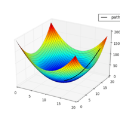Stochastic gradient descent (SGD) is a scalable and memory-efficient optimization algorithm for large datasets and stream data, which has drawn a great deal of attention and popularity. The applications of SGD-based estimators to statistical inference such as interval estimation have also achieved great success. However, most of the related works are based on i.i.d. observations or Markov chains. When the observations come from a mixing time series, how to conduct valid statistical inference remains unexplored. As a matter of fact, the general correlation among observations imposes a challenge on interval estimation. Most existing methods may ignore this correlation and lead to invalid confidence intervals. In this paper, we propose a mini-batch SGD estimator for statistical inference when the data is $\phi$-mixing. The confidence intervals are constructed using an associated mini-batch bootstrap SGD procedure. Using ``independent block'' trick from \cite{yu1994rates}, we show that the proposed estimator is asymptotically normal, and its limiting distribution can be effectively approximated by the bootstrap procedure. The proposed method is memory-efficient and easy to implement in practice. Simulation studies on synthetic data and an application to a real-world dataset confirm our theory.
翻译:随机梯度下降(SGD)是一种可扩展和内存高效的用于大数据集和流数据的优化算法,因此受到了广泛的关注和欢迎。基于 SGD 的估计器在统计推断如区间估计等方面的应用也取得了巨大的成功。然而,大多数相关工作都是基于独立同分布观测或马尔科夫链。当观测来自混杂时间序列时,如何进行有效的统计推断仍未被探索。实际上,观测之间的普通相关性对区间估计构成了挑战。大多数现有方法可能会忽略这种相关性并导致无效的置信区间。在本文中,我们针对数据为 $φ$-混杂的情况提出了一种小批量 SGD 估计器,用于统计推断。置信区间是使用相关的小批量 bootstrap SGD 程序构建的。使用《独立块》技巧(引用自 \cite{yu1994rates}),我们证明了所提出的估计器是渐进正常的,并且其极限分布可以通过引导程序有效地近似。所提出的方法在实践中易于实现且内存高效。对合成数据的模拟研究和对真实世界数据集的应用证实了我们的理论。



